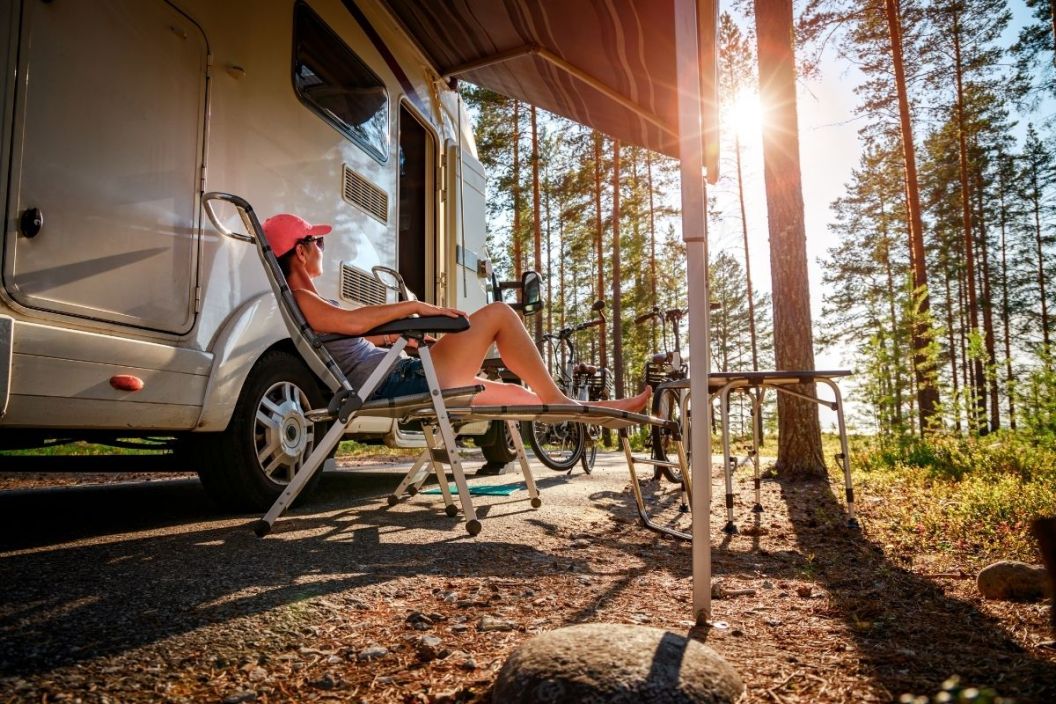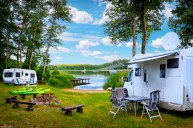RVing, whether full-time or not, is quite the investment and takes strategic and patient planning. While trying to spend the least amount of money possible, you'll also have to make decisions on when something is worth the expenses in the long run for your motorhome, camper, travel trailer, etc. So if you're planning to become an RVer or you're already one, here are eight tips for RVing on a budget, so that you can have the RV life you've always dreamed of.
RVing on a Budget: 8 Essential Tips!
1. Estimate Potential Spending
It's important to have an idea of how much you'll be budgeting, whether full-time RVing or just taking your RV out a few times a year for vacations here and there. When estimating how much you will need, you should consider how you're financing your RV (whether you have a used RV or a brand new one!), annual maintenance costs, campground fees, gas prices, and food costs. Figure out how much you'll be spending monthly, subtract fixed costs, and then prioritize the flexible expenses.
Create an RV budget based on these needs and make sure you stick to it. As you plan out the costs of your RV travel, below are ways you can save as much money possible to maximize your best RV living.
2. Gas Prices
RV camping means hitting the open road, which also means that gas prices will be important in your budgeting. It's recommended that whether you're towing or driving your RV, to not go over 60 mph. Any faster than that, and you're probably wasting your fuel. So enjoy the drive, and give people a nice wave as they pass you on the highway.
There are mobile apps that you can use to help you save on gas. Roadtrippers will help you plan the most efficient route while including the best stops and attractions on the way. Gas Buddy will help you find the cheapest prices in whatever area you're in, and using Waze will help you avoid traffic as much as possible, so that you won't burn gas parked in the middle of a highway.
3. Supplies
RELATED: RV Surge Protectors: What They Are & Why They Are So Important
During your trip, you'll have to do your best to try and repurpose everything until the items are completely futile. Use old towels and extra household items that are lying around your house to use on your camper, and take complimentary hotel toiletries with you to save on daily hygiene products. You want to avoid stopping at every Walmart in every city you travel through to grab last-minute necessities, by already being prepared with RV supplies you bought online.
4. Camping
The cheapest way to camp is by boondocking, which is also known as dry camping; you can find where to boondock on Boondockers Welcome. The site lists free campsites, including private forests, hideaways, and waterfront areas, where you can enjoy unhooking from modernity and embracing Mother Nature.
You can also search the Bureau of Land Management (BLM) and Wildlife Management Area (WMA) for public lands that offer cheap camping fees or free camping options. If you're not near any of those possibilities, you can also check out business or public parking lots that let cars stay overnight for free. Check out Harvest Hosts for wineries, farms, and breweries that allow you to hook up your RV overnight, but make sure to show proper etiquette by supporting their businesses. Exchange free camping for a stocked mini wine cellar and fresh produce.
5. Club Memberships
Instead of blowing your money on the more expensive campgrounds that include showers, clubhouses, pools, and whatever else may come with the expensive RV lifestyle, find a campsite that has only partial hookups. And if you frequent state parks, national parks, or certain campgrounds, consider buying an annual pass and taking advantage of resident savings programs.
If you absolutely need to be on private campgrounds with full hookups, then your best bet will be purchasing a club membership. The most well-known membership is Good Sam Club. You will save on over 2,400 participating campgrounds, while also getting discounts on fuel, propane, and even camping gear, with rates starting at just $29. Other camping club memberships also offer a help line if you find yourself needing extra hands with your RV.
6. Food
One of the biggest problems people run into while taking their RV trips is getting caught eating out too much. While convenient in having the money to do so, you'll do yourself a favor by cooking most of your meals in your RV with items you bought at the grocery store. Meal prepping and planning are key in this, along with freezing extra meals such as chili, stir fry, beef stew, spaghetti, pot roast, casseroles, soups, and more.
If you stop at an RV park or campground, use provided grills to prep more meals during your road trip. Make meals that are easy to reheat so you won't have to dedicate too much daily time into cooking. And if you do want to splurge a little, support local farmers' markets and neighborhood stores for seasonal produce and goods.
7. Renting Your RV
If you aren't planning to full-time RV all year round, one of the best ideas you can have in saving more money for your future trips is renting your RV out. If it's sitting in your driveway or in a private campground, rent it out as a property on Airbnb, especially if you live in a highly tourist area. You'll rake in the money while not having to worry about wasting your prior investments, and the extra cash can help keep up with regular maintenance, something you should also be aware of while budgeting.
8. Performing Regular Maintenance
Maintaining your RV is unavoidable, as issues will always arise on the road. RV insurance can become pricey if you're not regularly checking to make sure your travel trailer is running alright, so you'll want to go a little old school with how you approach repairs. There are many videos online that can teach you how to fix simple repairs, but if you're trying to avoid bigger issues, get your motorhome regularly serviced before you head back out on the road.
Have any tips you can share about saving money for RVers? Let us know on our Wide Open Roads Facebook!




